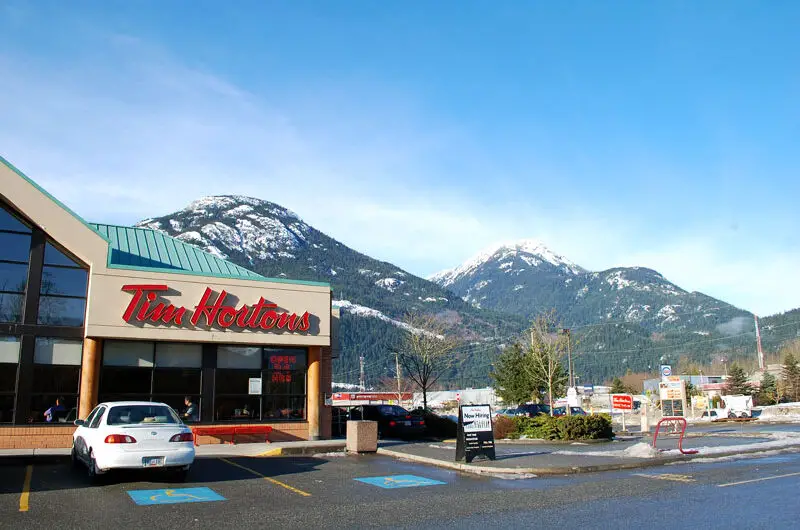Coffee is more than just a beverage—it’s a ritual, a culture, and for many, a daily necessity. From bustling metropolitan hubs to quaint small towns, coffee chains have woven themselves into the fabric of modern life, offering consistency, comfort, and caffeine to millions. But not all coffee chains are created equal. Some rise above the rest with exceptional brews, innovative offerings, and an unmistakable vibe. In this ultimate ranking, we dive into the 10 best coffee chains in the world, judged by coffee quality, global presence, customer experience, and that intangible magic that keeps us coming back for more. Grab a cup, and let’s explore.
10. Tim Hortons
Origin: Canada
Starting off our list is Tim Hortons, a Canadian icon that’s synonymous with coffee and donuts. Founded in 1964 by hockey legend Tim Horton, this chain has grown from a single location in Hamilton, Ontario, to over 4,800 outlets worldwide, with a strong presence in Canada, the U.S., and parts of the Middle East. Tim Hortons earns its spot for its reliability and affordability—two traits that resonate with its loyal fanbase.
The coffee here isn’t fancy; it’s straightforward, medium-roast, and brewed to please the everyman. Their signature “Double Double” (coffee with two creams and two sugars) is a cultural touchstone in Canada. While the menu has expanded to include iced cappuccinos and espresso-based drinks, Tim Hortons shines brightest as a no-frills stop for a quick, satisfying cup. Critics might argue it lacks the artisanal flair of higher-ranked chains, but for millions, “Timmies” is a comforting constant in a chaotic world.
9. Peet’s Coffee
Origin: United States
Peet’s Coffee, founded in Berkeley, California, in 1966, is often credited with igniting America’s specialty coffee revolution. Alfred Peet, a Dutch immigrant, introduced darker roasts and a focus on quality beans at a time when mass-market coffee dominated. Today, Peet’s boasts over 200 locations, primarily in the U.S., and a passionate following.
Peet’s coffee is bold—think deep, rich flavors that linger on the palate. Their Major Dickason’s Blend, a dark roast, is a standout, balancing intensity with smoothness. The chain also offers a range of espresso drinks and seasonal specials, often sourced from small-batch farms. The ambiance in Peet’s locations leans cozy and unpretentious, making it a favorite for coffee purists. While its limited global footprint keeps it lower on this list, Peet’s influence on the coffee world is undeniable.
8. Costa Coffee
Origin: United Kingdom
Costa Coffee, Britain’s biggest coffee chain, was founded in 1971 by Italian brothers Sergio and Bruno Costa. With over 4,000 locations across 31 countries, Costa has become a formidable player in the global coffee scene. Acquired by Coca-Cola in 2019, it’s poised for even greater expansion.
Costa’s strength lies in its consistency and variety. Their signature Mocha Italia blend offers a balanced, chocolatey flavor that appeals to a broad audience, while their Flat White—a nod to their Aussie-inspired coffee culture—is a fan favorite. Costa locations often feel warm and inviting, with plush seating and a focus on community. Though some purists argue it prioritizes mass appeal over artisanal quality, Costa’s accessibility and comforting vibe secure its place on this list.
7. The Coffee Bean & Tea Leaf
Origin: United States
Born in Los Angeles in 1963, The Coffee Bean & Tea Leaf (often just “Coffee Bean”) claims the title of America’s oldest privately-held specialty coffee chain. With over 1,000 locations across 20+ countries, it’s a West Coast staple that’s quietly built a global following.
Coffee Bean stands out for its versatility. Their coffee ranges from light, fruity roasts to dark, smoky blends, all sourced from top-tier regions like Ethiopia and Colombia. Their innovation shines with drinks like the Original Ice Blended—a creamy, coffee-based frappe that predates Starbucks’ Frappuccino. The chain also excels in tea offerings, a rarity among coffee-focused brands. While its smaller scale keeps it from the top tier, Coffee Bean’s quality and creativity make it a contender.
6. Lavazza (Espresso Bars)
Origin: Italy
Lavazza, Italy’s coffee titan, has been roasting beans since 1895. While primarily known as a coffee supplier, its branded espresso bars and cafes have popped up worldwide, from Milan to New York. These outlets embody Italian coffee culture—quick, precise, and unapologetically espresso-driven.
Lavazza’s coffee is a masterclass in tradition. Their espresso is intense, velvety, and served with a perfect crema, reflecting over a century of expertise. Signature blends like Qualità Rossa and Tierra! showcase their commitment to sustainability and flavor. The cafes themselves are sleek and minimalist, designed for efficiency rather than lingering. Lavazza ranks here for its authenticity and quality, though its smaller cafe network limits its global reach compared to others.
5. Dunkin’
Origin: United States
Dunkin’ (formerly Dunkin’ Donuts) is an American powerhouse, founded in 1950 in Quincy, Massachusetts. With over 12,000 locations in 36 countries, it’s a juggernaut of convenience and caffeine. While donuts once stole the spotlight, coffee is now Dunkin’s beating heart.
Dunkin’ coffee is approachable—medium-roasted, smooth, and designed for customization with flavors like caramel and mocha. Their Cold Brew and Frozen Coffee options have kept them relevant in a competitive market. The chain thrives on speed and value, with drive-thrus and mobile ordering catering to on-the-go drinkers. Dunkin’ doesn’t aim for sophistication, but its widespread appeal and consistency earn it a top-five spot.
4. Blue Bottle Coffee
Origin: United States
Blue Bottle Coffee, founded in Oakland, California, in 2002 by James Freeman, is the darling of the third-wave coffee movement. With a focus on single-origin beans, meticulous brewing, and a minimalist aesthetic, it’s expanded to over 100 locations across the U.S., Japan, and South Korea.
Blue Bottle’s coffee is an experience—think pour-overs brewed to order, showcasing bright, nuanced flavors from regions like Yirgacheffe, Ethiopia. Their New Orleans-style iced coffee, sweetened with chicory, is a cult classic. The cafes are stark yet serene, often with baristas who double as coffee educators. While its smaller scale and premium pricing keep it from the top three, Blue Bottle’s dedication to craft is unmatched.
3. Pret A Manger
Origin: United Kingdom
Pret A Manger, launched in London in 1986, might be best known for its sandwiches, but its coffee game is a quiet powerhouse. With over 450 locations worldwide, Pret has carved a niche as a grab-and-go chain with a surprising focus on quality.
Pret’s coffee is organic, sourced from Rainforest Alliance-certified farms, and roasted to a medium-dark profile that’s robust yet smooth. Their flat whites and lattes rival specialty cafes, and their barista training is top-notch. The vibe is fast-paced but friendly, with an emphasis on sustainability—think reusable cup discounts and compostable packaging. Pret sneaks into the top three for its balance of quality, ethics, and accessibility.
2. Starbucks
Origin: United States
Starbucks, born in Seattle in 1971, is the undisputed king of coffee chains by sheer scale, with over 35,000 locations in 80 countries. What started as a small roastery has become a global phenomenon, shaping how the world drinks coffee.
Starbucks excels in variety and innovation. Their Pike Place Roast is a reliable classic, while seasonal Pumpkin Spice Lattes and Frappuccinos keep the menu fresh. The Starbucks Reserve Roasteries—upscale cafes with rare beans and theatrical brewing—elevate their game further. The ambiance varies from cozy to corporate, but the consistency is unmatched. Critics call it over-roasted or overhyped, but Starbucks’ influence, reach, and adaptability land it at number two.
1. Café de Flore (Historical Legacy & Independent Spirit)
Origin: France
Topping our list is Café de Flore, a Parisian legend since 1887. Unlike the sprawling chains above, it’s a single, iconic location in Saint-Germain-des-Prés—but its influence and prestige make it the ultimate coffee destination. (Note: For this ranking, we’re bending the “chain” definition to honor its cultural weight.)
Café de Flore’s coffee is quintessentially French—strong, simple espresso served in delicate cups, often with a side of intellectual history. Sartre, Camus, and Picasso once sipped here, cementing its status as a cultural hub. The ambiance is timeless: red banquettes, Art Deco mirrors, and waiters in crisp aprons. Quality is paramount, with beans roasted to perfection and drinks crafted with care. Café de Flore earns the top spot not for scale, but for embodying the soul of coffee culture.
Honorable Mentions
- Caribou Coffee (U.S.): A Midwest gem with cozy vibes and solid roasts.
- Second Cup (Canada): A smaller chain with a focus on bold flavors.
- Gloria Jean’s (Australia): A global player with a knack for flavored coffees.
What Makes a Coffee Chain the Best?
Ranking coffee chains is no easy feat. Coffee quality is king—sourcing, roasting, and brewing all matter. Global presence reflects influence and reliability. Ambiance sets the mood, whether it’s a quick stop or a linger-worthy cafe.
Innovation keeps things exciting, and customer loyalty ties it all together. Café de Flore may lack branches, but its legacy outshines even Starbucks’ empire. Meanwhile, chains like Tim Hortons and Dunkin’ prove mass appeal can coexist with quality.
Final Sip
From the historic charm of Café de Flore to the ubiquitous green siren of Starbucks, the world’s best coffee chains offer something for everyone. Whether you crave a artisanal pour-over or a budget-friendly brew, this list celebrates the diversity of coffee culture. So, next time you’re craving a cup, consider stepping into one of these top 10—or better yet, debate the ranking over a latte with friends. What’s your favorite? The coffee world is yours to explore.


















